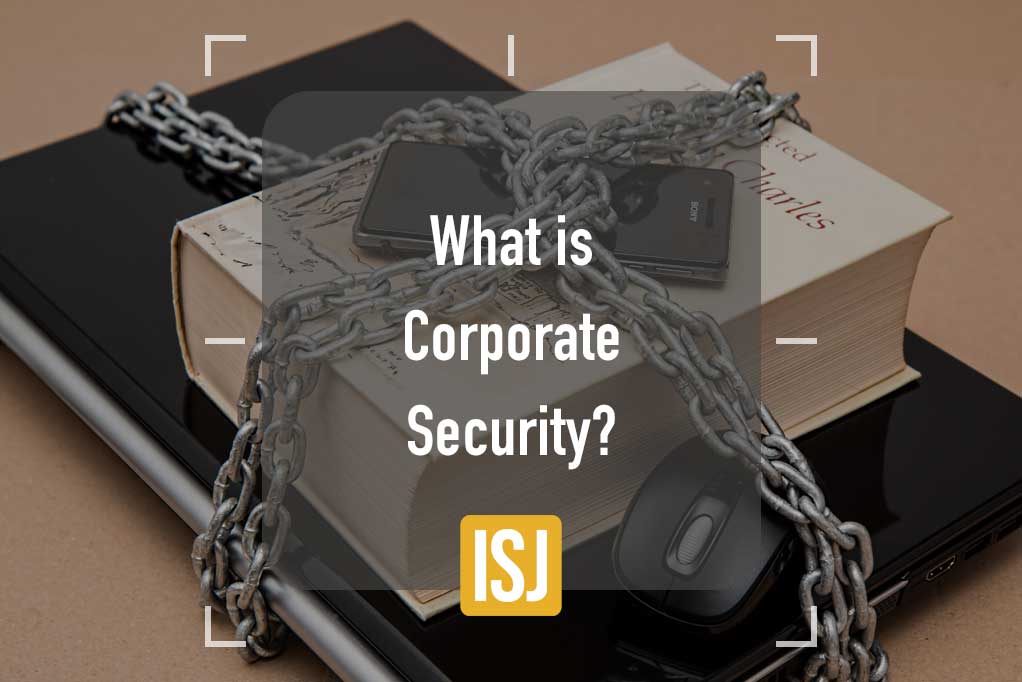What is Corporate Security?


Simon Burge
Share this content
Corporate security refers to measures implemented by an organisation to protect physical, financial, intellectual, and human assets from various threats..
These risks may include theft, fraud, cyber attacks, natural disasters, terrorist attacks, and other potential dangers.
Surveillance and monitoring systems, security officers and other security measures are of great importance to safeguarding an organisation from these kinds of risks and threats.
Unfortunately, there’s numerous situations which could lead to internal and external threats becoming a reality.
Hence, corporate security must be a serious consideration for any size of business.
Investing in corporate security helps to safeguard assets, intellectual property, sensitive information, resources, staff, customers, technologies and data from potential threats.
Below we explore what corporate security entails, its key components and how it’s implemented.
Article Chapters
ToggleWhat is Corporate Security?
Corporate security aims to maintain the confidentiality, integrity, and availability of company information, assets, and personnel.
The term used to describe ways to prevent or mitigate actual risks that a company could face.
Various strategies are used to plan for potential threats, while overseeing that the company’s departmental infrastructure can be maintained.
Corporate security strategies also comprise ways to respond to threats which come up unexpectedly.
Nowadays, corporate security has become commonplace, especially when considering the rise in cybercrime, remote working and technological advancements.
Security complications could arise as a result of such scenarios, hence companies need to be willing to invest in corporate security to safeguard against consequences that will have a negative impact.
Benefits of Corporate Security

Nowadays, organisations of all types and size are susceptible to crime.
Hence, it’s crucial to invest in corporate security, as there are numerous advantages that can be gained from it.
Corporate security helps to prevent workplace crimes, including theft, assault and property damage.
It also helps to safeguard people, such as employees as well as customers, as such crimes are on the increase.
Moreover, industrial security management helps to protect an organisation’s reputation.
Here’s a list of the core benefits from implementing a sound corporate security policy:
Company Asset Protection
The company’s assets can be safeguarded thanks to an effective corporate security strategy.
Assets may include but are not limited to physical such as facilities, but also technology and data, as well as the employees.
A sound strategy helps to deter criminal activity, prevent financial losses and protect the various company assets in the process.
Protect Corporate Grounds
There’s no way to predict when a crime might take place.
But this does not mean that one should not be well prepared in the event this happens.
These days, the stakes of such occurrences are significantly higher.
Property and personal losses due to burglaries amount to staggering amounts.
Thus preventative measures to protect and safeguard corporate grounds should not be ignored.
Security systems designed to protect against intruders, or anyone who can carry out some kind of unwelcome or undesirable activities are critical.
In reality, one needs to be aware that even insiders, such as employees, vendors and personnel who are generally trusted could act in a negative way.
Hence wired or wireless security cameras in critical areas, alarms, motion sensors, door and window sensors, are some of the common security systems which one may wish to invest in order to protect property grounds sufficiently.
Theft Prevention
Unfortunately, cybercriminals are becoming more successful and adept in stealing sensitive information by circumventing networks with weak security systems.
As a result, company data can be accessed by unauthorised people, leading to damage to the business’s reputation, loss of data and potential litigation proceedings.
Hence, without effective security measures, crimes can easily occur, as well as manage to go undetected.
Alarm monitoring, sensors and security officers are some of the ways which could reduce crimes such as theft.
Key Components of Corporate Security
The following are key elements of a sound corporate security policy:
Implementing Legal Measures
Corporate security strategies are vital to protecting your organisation from various kinds of unlawful activities, which unfortunately, are all around us in modern society.
Such strategies will also be crucial in providing the necessary legal support should any such incidents occur.
It’s important to develop policies with a good legal precedent at the back of your mind.
You need to be aware of the laws which could be violated, and to act in accordance with them to ensure compliance.
As a result, it’s often necessary to seek professional assistance in this regard.
Managing Security Risks
A crucial part of corporate security revolves around managing security risks.
This includes physical crimes as well as IP violations, and data management breaches, among others.
Unfortunately, risks are inevitable, and thus a sound corporate security policy needs to be in place to address the various threats in a proactive manner.
Any weak points will need to be seen to in order to reduce the possibility of incidents occurring.
Challenges and risks need to be anticipated and planned for adequately.
Core Corporate Operations
Corporate security needs to be seen as a key operation.
Each and every department needs to take it seriously.
Ideally, all employees need to be trained in this regard to fully understand and appreciate the importance of corporate security, and the consequences of failure to follow them.
Collaboration
Corporate security needs to be implemented in collaboration with other functions, across all teams within an organisation.
As the saying goes, a chain is only as strong as its weakest link.
Hence, to ensure a strong corporate security strategy, it’s imperative that there are company-wide collaborations.
Incident drills and training should be carried out on a regular basis.
All employees need to share a common goal in minimising any weak links, and act accordingly for the best possible results.
Corporate Security Job Roles

There are various careers in the field of corporate security, including:
Security Analyst
A security analyst is responsible for developing and implementing security procedures in order to better safeguard the computer systems within an organisation.
This includes firewalls, software and data encryption.
A security analyst will generally take care of these.
Fire Inspector
A fire inspector checks buildings in order to identify any potential fire dangers.
This is important in order to ensure that local and national legislative measures are being followed.
A fire inspector will typically be hired by a governmental entity,with in organisations which have large structures such as stadiums and arenas.
Emergency Management Director
The role of an Emergency Management Director revolves around developing strategies and processes to deal with the eventuality of natural disasters or catastrophes.
An Emergency Management Director’s job also includes the leadership of the response team should such occurrences take place.
This may also include collaborating with government agencies.
In such eventualities, there will need to be a joint effort in reacting decisively, including evacuation and recovery activities.
Why is Corporate Security Important?
Corporate security is of utmost importance in this day and age for numerous reasons.
The risks are very real, and unfortunately, there are wide ranging threats surrounding us, making it critical to be well prepared.
Current Threats
Every organisation, regardless of its size is susceptible to falling foul to cybersecurity breaches.
However, small business owners are generally unconcerned, as they believe that they are less likely to be targeted.
Nothing could be further from the truth!
Every organisation is just as likely to experience some kind of security related incident at some point in time.
This could be a misuse of confidential information, or a data breach, for example.
Such threats are quite common, hence a solid corporate security policy should be in place in order to manage such risks.
Evolving Threats
Apart from current threats, it’s also important to note that there’s risks which are ever evolving.
We need to appreciate the fact that with the rise in ecommerce and remote working in recent years, the risks have increased and evolved continuously.
As a result, it’s crucial that the organisation’s corporate security strategy evolves in tandem.
How to Create & Implement a Corporate Security Plan
Creating and implementing a sound corporate security plan will help to mitigate possible threats.
The following steps are important to create a workable and effective plan for your organisation’s corporate security:
Analyse Security Requirements
The first step is to carefully analyse your organisation’s security requirements.
This is crucial as you’ll be able to measure current risks, evolving threats, and investigate past incidents to take away key lessons.
It’s important to understand that every organisation’s security requirements are unique.
As a result, the corporate security policy needs to be developed to suit.
Proactive Incident Response
Proactively identifying incidents is better than acting in reactively.
As the saying goes, prevention is better than cure.
The outcome would be less damaging if preventative measures were in place beforehand.
A proactive incident response plan also offers more guidance and confidence.
Executing a Security Plan
Once the planning phase is completed, you’ll then need to move on to executing the security plan.
It’s important to make use of risk assessments which were carried out during the planning phase, as well as take time to analyse incident history.
This will help you devise a plan that conforms with governmental guidelines, which can ensure collaboration across the various organisational departments.
It cannot be emphasised strongly enough that each and every team member needs to fully understand and appreciate the importance of such a plan.
Everybody needs to be on board.
It may be helpful to document the security plan in order to outline clear guidelines and points of reference.
Regular reminders can also be sent regarding security and usage protocols.
Every employee needs to feel empowered in this regard for best results.
Another way to encourage security compliance is to offer rewards to any incident reporters.
You could give recognition to any individuals or teams who demonstrate they’re doing their best to practice smart corporate security.
How to Improve Corporate Security

Constantly improving your organisation’s corporate security is of utmost importance to mitigate any possible threats as best as possible.
Hence, while a solid security plan should be in place and clearly documented, it’s also important to engage in regular improvements to be in line with evolving risks and threats.
Security First Mindset
While documenting your security strategy is important, it’s even more crucial to ensure that all personnel involved have a security first mindset.
Employees need to be made aware of corporate security policies, and feel empowered to follow them.
Security needs to be a key, corporate thought for all personnel.
Thus all employees should have a mindset with which they are constantly vigilant to potential security threats.
All employees should know how to identify them and go about reporting them.
Involve Everyone
The security first mindset should be present across the entire organisation.
All employees need to be on board in this, and hopefully, they should all feel passionate about the field.
If all advocate corporate security, the chances of maintaining it across the organisation are much better.
Regular training can also help in this.
Loss Prevention
Active loss prevention methods should be present to safeguard against breaches, theft and other crimes.
Loss prevention methods such as storefront security, technological advancements, and other security measures are crucial to keep your organisation safe in a comprehensive manner.
How to Move Your Corporate Security Forward
Corporate security is not only important, but also a field which is constantly changing and evolving.
We all know that when it comes to technology, regular advancements are the rule of thumb.
This, coupled with increased remote working and cybercrime on the rise, make it critical to having a mindset to constantly move your corporate security policies forward.
Always strive to cover all bases as best as you possibly can.
Areas of active risks should be constantly evaluated.
Moreover, decisions in this field need to be taken quickly to ensure that your assets and people are fully protected.
Conclusion
Every type and size of organisation should invest in corporate security and have a sound policy which ensures they’re able to anticipate and prevent problems and threats.
Simply taking a reactive standpoint will lead to disastrous consequences.
Having a solid ‘security first’ defense mindset has become of great importance as you can safeguard your assets, employees, and ultimately, your reputation.


